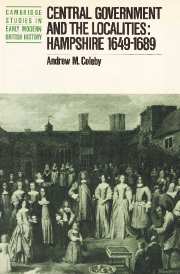EPILOGUE AND CONCLUSION
Published online by Cambridge University Press: 14 October 2009
Summary
The king's flight and its aftermath provoked confusion rather than consensus amongst the ruling elites of Hampshire. Richard Norton probably spoke for many when he wrote to the earl of Dartmouth in amazement soon after the king's first departure: ‘Oh, unhappy man to follow such counsel, the like was never or will be in story, a king with a great army driven out of his kingdom by a lesser army without fighting.’ The Convention Parliament of 1689 would settle James' fate.
But the Revolution of 1688–9 far from uniting Hampshire's elites, merely contributed further to their political fragmentation, as different groups and interests reacted to central events. Personal ambition and rivalry were very apparent in the elections to the Convention, in which four of the county's boroughs experienced contests, and three gentlemen competed for one of the county seats in February 1689 after Lord William Paulet, who had been elected with his elder brother Lord Wiltshire, took the unusual step of deciding to sit for Winchester, where he had also been elected. Sir Robert Holmes was able to use his position as coroner of the Isle of Wight to defend his interest there, in the face of strong opposition. He lost control of Newport to the local gentry, but retained the nomination in the other two boroughs, having himself returned for Yarmouth and two officials Lord Ranelagh and Thomas Done for Newtown.
- Type
- Chapter
- Information
- Central Government and the LocalitiesHampshire 1649-1689, pp. 229 - 236Publisher: Cambridge University PressPrint publication year: 1987



